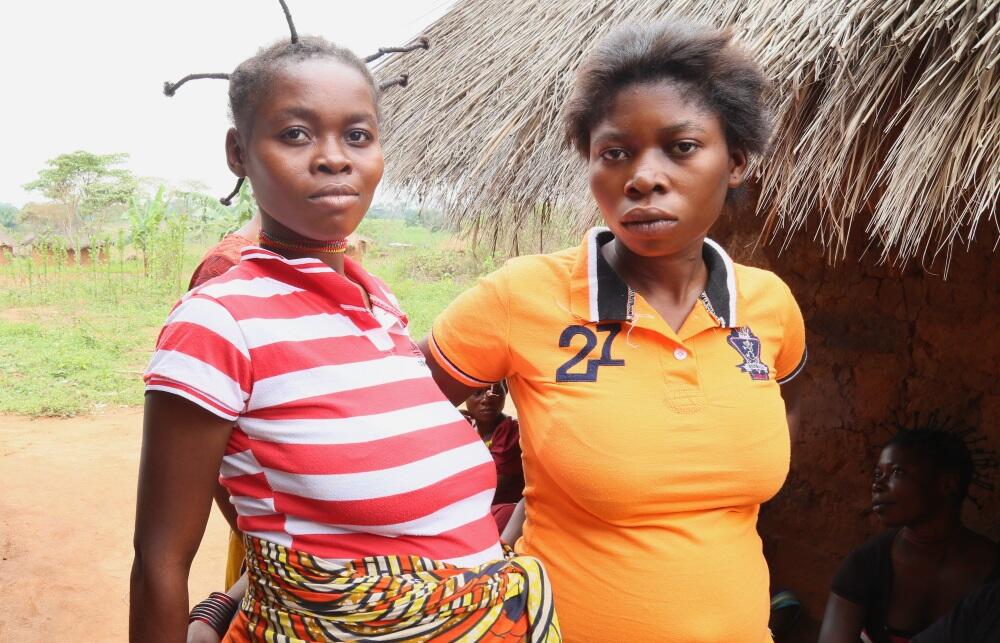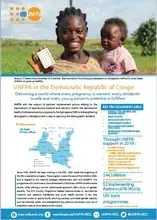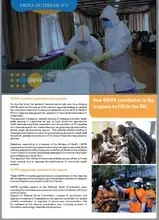MANGINA, North Kivu, Democratic Republic of the Congo—As if the consequences of an ongoing armed conflict were not already challenging, Mangina Reference Health Centre has found itself at the heart of the current outbreak of Ebola in the Democratic Republic of the Congo.
They were bleeding everywhere and we did not know what had happened [to them].
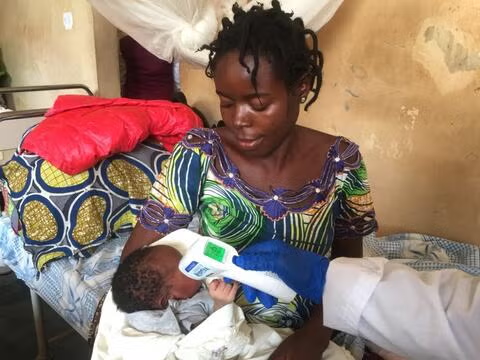
measures against EVD transmission at Beni General Referral Hospital.
© UNFPA DRC
“We had two sick people in the centre – a man and a youth – who died of unknown causes. They were bleeding everywhere and we did not know what had happened [to them],” said Sister Yvette Kanyere.
Managed by Sister Kanyere, the referral health centre had never experienced such a disease before. Soon, her worst fears would be realized.
The Provincial Health Authority was alerted and, together with World Health Organization (WHO) officials, visited Mangina on 31 July. Six patients at the referral health centre met the case definition for acute haemorrhagic fever and specimens tested by the National Biomedical Research Institute (INRB) proved positive.
“The diagnosis of Ebola was made,” said Sister Kanyere.
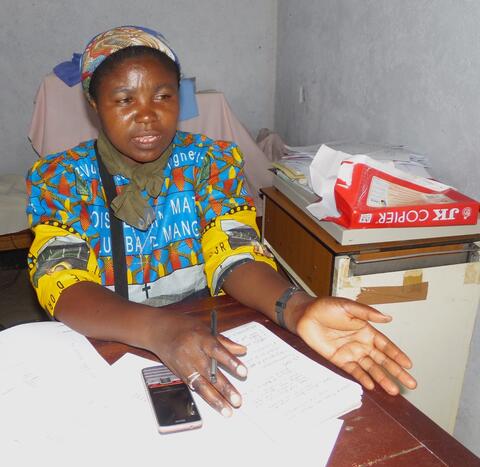
Mangina Reference Health Centre, said Sister Yvette Kanyere, the
facility manager. © UNFPA DRC
New Ebola outbreak declared
On August 1, the Ministry of Health declared an Ebola outbreak in North Kivu province, just one week after WHO and the Congolese Health Ministry had declared the end of the previous outbreak that began in May this year.
As word of the confirmed cases of Ebola spread, people in the surrounding communities were afraid to attend the health centre in fear that they might become infected. Yet, with financial support that has enabled the provision of free care for patient recovery at the facility, more people have begun seeking medical assistance.
Ebola is a contagious disease and the best way to prevent it is to be well informed. To help people understand Ebola, we are raising awareness.
“Ebola is a contagious disease and the best way to prevent it is to be well informed,” said Sister Kanyere. “To help people understand Ebola, we are raising awareness. Two sisters are part of the group of sensitizers who explain the mode of prevention and routes of contamination.”
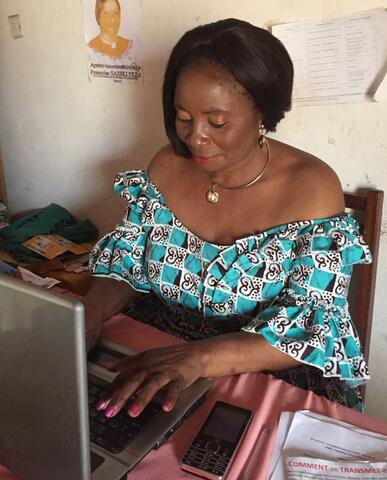
is key in the response. Françoise Muhunga Sadiki,
National Coordinator of Christian Action for
Development, does sensitization work at 63 sites in
Béni and Lubero territories. © UNFPA DRC
Awareness of how the disease spreads is key
Since the current outbreak of Ebola Virus Disease, largely affecting two provinces in the DRC – North Kivu and Ituri – others have joined the fight to contain Ebola.
Françoise Muhunga Sadiki, National Coordinator of local NGO Christian Action for Development, first heard about Ebola during an awareness session at Béni City Hall and was inspired to approach the sensitizers. She offered to do sensitization work at 63 sites the NGO covers in its work in Béni and Lubero territories.
“I decided to proceed with sensitization [of] the people that we support (widows, orphans and young people). Many of them are vulnerable and if they get this disease, it will increase their suffering,” she said.
Since the start of the new epidemic, 124 cases of Ebola have been reported, as at September 3. Of these, 93 cases have been confirmed – including 13 health workers. The outbreak has claimed the lives of 54 people among the confirmed cases – a lethality of 58 per cent.
To date, 18 people who had Ebola were confirmed cured and 6,134 people have been vaccinated. More than 4,200 people who had contact with suspected Ebola patients have been registered, and 2,068,733 travellers have been screened.
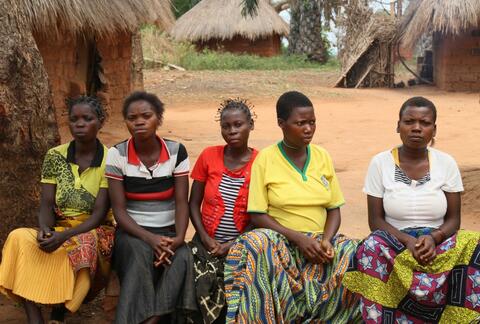
displaced and created 630,000 refugees. More than 13.1 million people
are in need of humanitarian assistance. © UNFPA DRC
Ebola outbreak in a humanitarian crisis
What makes the DRC a particularly difficult case for the Ebola response is the ongoing conflict in the two eastern DRC provinces due to the presence of armed groups. The conflict has led to 4.49 million internally displaced people and 630,000 refugees, while 13.1 million people are in need of humanitarian assistance.
The resulting insecurity has created the challenge of accessing communities in areas affected by the presence of rebel groups. It is difficult for health workers to cross rural expanses on motorcycles to reach communities due to safety concerns.
In the areas that I can reach safely, I sensitize pastors and their spouses, women and men, as well as adolescents and mothers.
“Our city has a history of war, which has led to many deaths and causalities. One more death is [one] too many. In the areas that I can reach safely, I sensitize pastors and their spouses, women and men, as well as adolescents and mothers, in the three large markets of Béni,” said Ms. Sadiki.
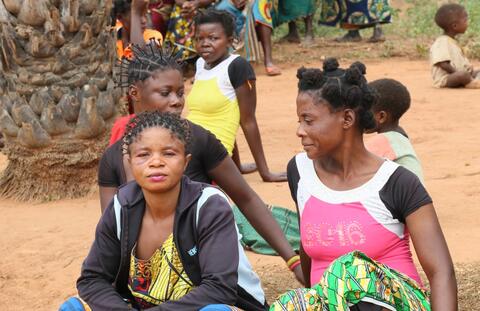
the world. The prevalence and intensity of all forms of sexual violence
in the country has been described as the worst in the world.
© UNFPA DRC
Women at higher risk due to sexual violence
Due to the ongoing insecurity, women and girls are suffering disproportionately from the infectious disease.
The eastern part of the country in particular has been described as the ‘rape capital of the world’, and the prevalence and intensity of all forms of sexual violence in the DRC have been described as the worst in the world.[1]
Because Ebola is highly contagious, the survivors are vulnerable to infection. They are also at greater risk of sexual violence and rape, as outbreaks of infectious diseases create a level of instability that makes them more vulnerable.
Since the Ebola outbreak in the two provinces, 58 per cent of confirmed cases are among females, increasing the impact on communities as women play a key role in the family’s survival.
UNFPA response targets maternity services including midwives
The DRC Ministry of Health, with support from partners including UNFPA, have put in place a response plan that will target not only the two affected provinces but also the countries that share borders with the affected areas – Uganda, Burundi and Rwanda.
In order to prevent and control the spread of the infection, UNFPA is supporting infection prevention and control at reproductive health services delivery points, including maternity units.
Women are the most affected by the Ebola outbreak in North Kivu and Ituri. This is why UNFPA is prioritizing reproductive health service delivery points and protecting the workforce of midwives.
“Women are the most affected by the Ebola outbreak in North Kivu and Ituri. This is why UNFPA is involved in communicating, preventing and controlling infection by prioritizing the reproductive health service delivery points and protecting the workforce of midwives,” said Sennen Hounton, UNFPA Representative for the DRC.
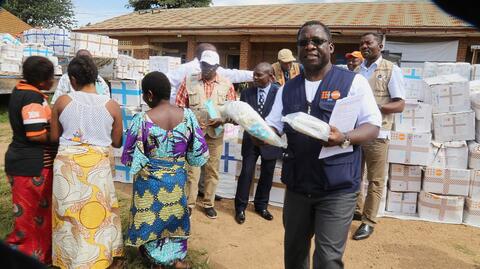
and UNFPA staff distributing hygiene kits to women at a ceremony for
handing over medical and surgical equipment to the Acting Mayor of
Béni, Modeste Bakwanamaha, and the Director-General for Disease
Control, Dr. Bathé Ndjoloko Tambwe. © UNFPA DRC
Medical supplies donated include vaccination syringes
Last week, UNFPA contributed medical surgical materials and reproductive health medicines to the National Ministry of Health, as part of the response to the outbreak of the disease. UNFPA also donated 10,000 syringes to support vaccination activities in Ebola-affected areas, which has contributed to the vaccination of more than 6,000 people.
“We have just handed over to the Congolese government 10 tons of medical and surgical materials and reproductive health medicines to break the chain of transmission of EVD in the maternity wards of Béni and Mangina for women who come to give birth,” said Mr. Hounton.
The supplies will help reach 31,000 people. The contribution will improve the quality of deliveries to ensure safe delivery, combat infections including sexually transmitted infections (STIs), help fight sexual and gender-based violence, and reduce the cost of a secure blood transfusion.
The material consists of the following:
- Individual hygiene delivery kits to ensure deliveries free of infectious risk, even out of health facilities;
- Kits for managing STIs;
- Post-rape care kits to provide medical treatment for survivors of sexual violence, including children;
- Medical delivery kits with equipment and supplies such as gloves, compresses, antiseptics, instrument boxes, and delivery boxes;
- Obstetrical surgery kits to allow more than 10,000 surgeries in four health facilities;
- Transfusion safety kits to screen for infections such as syphilis, hepatitis, HIV and malaria, to enable safe blood transfusions.
Ensuring that women delivery safely
It is critical to ensure that women can deliver safely, especially in times of humanitarian crisis. In the DRC’s case the presence of a lethal disease such as Ebola makes safe delivery that much more challenging.
On average, Béni General Reference Hospital maternity ward has 80 to 150 deliveries a month and a capacity of 42 beds, while around 120 deliveries a month are conducted at the Health Reference Centre in Mangina.
The donation of equipment will go a long way towards preventing the deaths of mothers and their newborn babies in this challenging context.
Since I started these awareness sessions, I have witnessed some changes in people’s behaviour.
And just as key in the response to Ebola are messages on prevention.
“Since I started these awareness sessions, I have witnessed some changes in people’s behaviour,” said said Sister Yvette Kanyere. “One can see that people now wash their hands, and that they are more and more responsible towards their sexual choices because they were told that Ebola can also be transmitted sexually.”
She is pleased that her actions are making a difference. And she remains hopeful.
“We pray that this epidemic will stop,” she said.
By Aimee Manimani Nsimire

